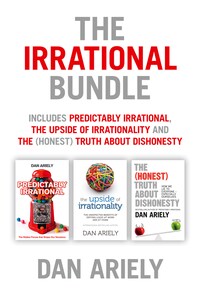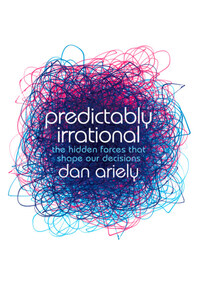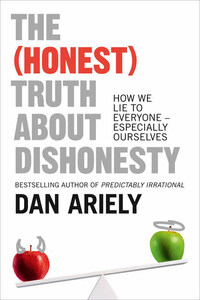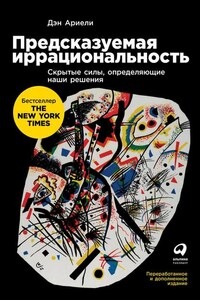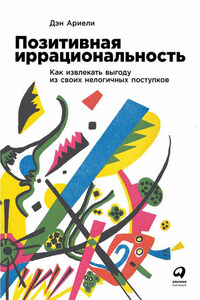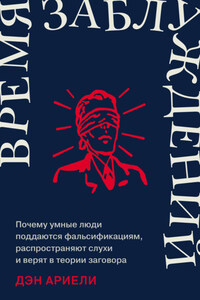Dedication
To my mentors, colleagues, and students—
who make research exciting
DEDICATION
INTRODUCTION
How an Injury Led Me to Irrationality and to the Research Described Here
CHAPTER 1 - The Truth about Relativity
Why Everything Is Relative—Even When It Shouldn’t Be
CHAPTER 2 - The Fallacy of Supply and Demand
Why the Price of Pearls—and Everything Else—Is Up in the Air
CHAPTER 3 - The Cost of Zero Cost
Why We Often Pay Too Much When We Pay Nothing
CHAPTER 4 - The Cost of Social Norms
Why We Are Happy to Do Things, but Not When We Are Paid to Do Them
CHAPTER 5 - The Power of a Free Cookie
CHAPTER 6 - The Influence of Arousal
Why Hot Is Much Hotter Than We Realize
CHAPTER 7 - The Problem of Procrastination and Self-Control
Why We Can’t Make Ourselves Do What We Want to Do
CHAPTER 8 - The High Price of Ownership
Why We Overvalue What We Have
CHAPTER 9 - Keeping Doors Open
Why Options Distract Us from Our Main Objective
CHAPTER 10 - The Effect of Expectations
Why the Mind Gets What It Expects
CHAPTER 11 - The Power of Price
Why a 50-Cent Aspirin Can Do What a Penny Aspirin Can’t
CHAPTER 12 - The Cycle of Distrust
CHAPTER 13 - The Context of Our Character, Part I
Why We Are Dishonest, and What We Can Do about It
CHAPTER 14 - The Context of Our Character, Part II
Why Dealing with Cash Makes Us More Honest
CHAPTER 15 - Beer and Free Lunches
What Is Behavioral Economics, and Where Are the Free Lunches?
THANKS
LIST OF COLLABORATORS
NOTES
BIBLIOGRAPHY AND ADDITIONAL READINGS
PRAISE FOR PREDICTABLY IRRATIONAL
Introduction
How an Injury Led Me to Irrationality and
to the Research Described Here
I have been told by many people that I have an unusual way of looking at the world. Over the last 20 years or so of my research career, it’s enabled me to have a lot of fun figuring out what really influences our decisions in daily life (as opposed to what we think, often with great confidence, influences them).
Do you know why we so often promise ourselves to diet, only to have the thought vanish when the dessert cart rolls by?
Do you know why we sometimes find ourselves excitedly buying things we don’t really need?
Do you know why we still have a headache after taking a one-cent aspirin, but why that same headache vanishes when the aspirin costs 50 cents?
Do you know why people who have been asked to recall the Ten Commandments tend to be more honest (at least immediately afterward) than those who haven’t? Or why honor codes actually do reduce dishonesty in the workplace?
By the end of this book, you’ll know the answers to these and many other questions that have implications for your personal life, for your business life, and for the way you look at the world. Understanding the answer to the question about aspirin, for example, has implications not only for your choice of drugs, but for one of the biggest issues facing our society: the cost and effectiveness of health insurance. Understanding the impact of the Ten Commandments in curbing dishonesty might help prevent the next Enron-like fraud. And understanding the dynamics of impulsive eating has implications for every other impulsive decision in our lives—including why it’s so hard to save money for a rainy day.
My goal, by the end of this book, is to help you fundamentally rethink what makes you and the people around you tick. I hope to lead you there by presenting a wide range of scientific experiments, findings, and anecdotes that are in many cases quite amusing. Once you see how systematic certain mistakes are—how we repeat them again and again—I think you will begin to learn how to avoid some of them.
But before I tell you about my curious, practical, entertaining (and in some cases even delicious) research on eating, shopping, love, money, procrastination, beer, honesty, and other areas of life, I feel it is important that I tell you about the origins of my somewhat unorthodox worldview—and therefore of this book. Tragically, my introduction to this arena started with an accident many years ago that was anything but amusing.
ON WHAT WOULD otherwise have been a normal Friday afternoon in the life of an eighteen-year-old Israeli, everything changed irreversibly in a matter of a few seconds. An explosion of a large magnesium flare, the kind used to illuminate battlefields at night, left 70 percent of my body covered with third-degree burns.
The next three years found me wrapped in bandages in a hospital and then emerging into public only occasionally, dressed in a tight synthetic suit and mask that made me look like a crooked version of Spider-Man. Without the ability to participate in the same daily activities as my friends and family, I felt partially separated from society and as a consequence started to observe the very activities that were once my daily routine as if I were an outsider. As if I had come from a different culture (or planet), I started reflecting on the goals of different behaviors, mine and those of others. For example, I started wondering why I loved one girl but not another, why my daily routine was designed to be comfortable for the physicians but not for me, why I loved going rock climbing but not studying history, why I cared so much about what other people thought of me, and mostly what it is about life that motivates people and causes us to behave as we do.
